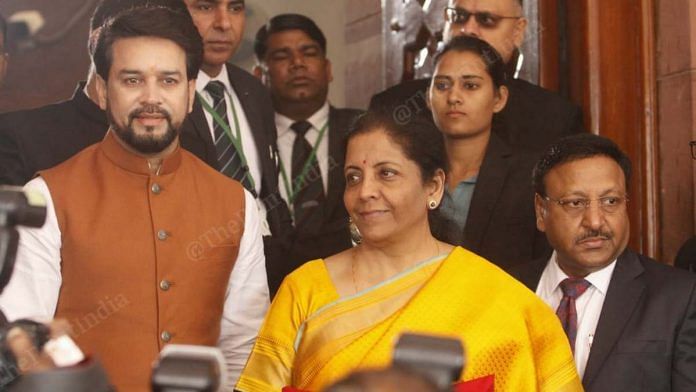New Delhi: The Fifteenth Finance Commission, under chairman N.K. Singh, has recommended that states receive 41 per cent share of the total central taxes for the year 2020-21.
In its interim report, the finance commission said it has tried to observe the “canon of continuity”. The panel is “keeping the vertical split of the net proceeds of Union government’s taxes virtually unchanged” at 42 per cent after adjusting one percentage points for the needs of the two new Union territories of Jammu and Kashmir and Ladakh, it said.
The finance commission decides what percentage of the total share of central taxes will go the states. The 14th Finance Commission in its report had recommended that a record 42 per cent of the divisible pool of taxes should go to the states.
The Singh-led committee’s recommendations are part of the interim report that the panel has submitted for the year 2020-21.
Finance Minister Nirmala Sitharaman tabled the report in the Parliament ahead of the presentation of the Union Budget 2020-21. In her speech, she said the government has accepted the measures of the commission in “substantial measure”.
The report
The 15th Finance Commission was given an extension to submit the final report after an expansion in its terms of reference. The committee will now provide its report by October 2020 and cover the years 2020-21 to 2025-26.
The split of the total proceeds within the states has been based on criterion like population, area, demographic performance, income, forest and ecology, and tax efforts.
The latest commission has been at the centre of a controversy after many southern states opposed the terms of reference which would have disincentivised the successful population control measures taken by them over the last few decades and put them at a disadvantage in comparison to some of the populous northern states like Uttar Pradesh.
The terms of reference had asked the commission to take population figures according to Census 2011 rather than Census 1971.
In its interim report, the panel said while using the 2011 population figures, it has factored in the relative success of states in controlling the fertility rates. However, states like Kerala are likely to protest the fall in their share.
Share of states
Uttar Pradesh has received the highest share among the states at 17.9 per cent of the total funds, followed by Bihar at 10.06 per cent, Madhya Pradesh at 7.8 per cent and Maharashtra at 6.1 per cent.
While UP’s share is virtually unchanged compared to the 14th Finance Commission, Bihar’s share has increased marginally by 0.4 percentage points. Madhya Pradesh’s share has increased by 0.3 percentage points and Maharashtra’s by 0.6 percentage points.
Shares of southern states like Kerala, Andhra Pradesh and Telangana have come down. Kerala’s share fell from 2.5 per cent to 1.9 per cent, Andhra Pradesh’s from 4.3 per cent to 4.1 per cent and Telangana’s share from 2.4 per cent to 2.1 per cent.
Also read: Nirmala Sitharaman raises FY20 fiscal deficit projection to 3.8%, FY21 target set at 3.5%




How else will South make money and subsidize BIMARU states in the North,year after year? The south makes $1 and gets back 20 to 40 cents.